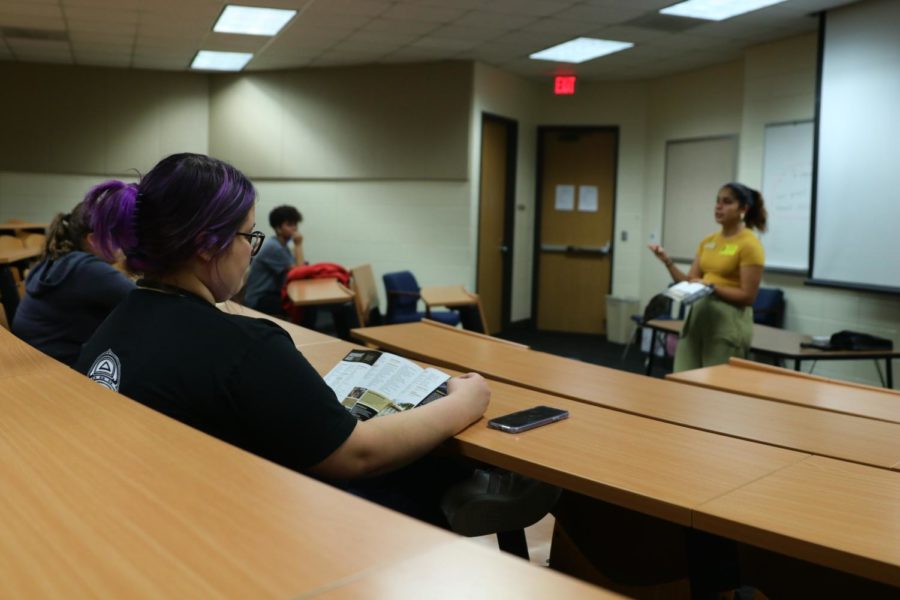The GPA Game
Clock ticks for seniors as college application season kicks off
Senior Madilyn Dominguez-Lowry reads a pamphlet as a College Representative from Purdue comes to talk about what their college has to offer.
Some students are strategically picking classes in order to boost their GPAs to look more appealing to colleges. This lucrative planning makes the focus on GPAs almost like a game. Students are choosing to play this game or opt out and focus on other things. This game plays a seemingly important role in college admissions. But first what are GPAs?
“It’s a numerical based ranking,” senior Elijah Guerrero said. “My understanding is that depending on your classes and their difficulty, it’s weighted differently. It depends on how well you do in the class and from there it’s calculated into your final GPA which goes into your class rank.”
GPAs or grade point averages are made up of all four years of classes a student takes averaged out into a number. This number is used by many colleges to evaluate your academic performance making it notable to some.
“GPAs are significant in the fact that it is a piece of information that colleges use,” College and Career Counselor Jennifer Shock said. “It’s not the be all and end all as far as looking at your body of work but it is a representation based on our scale and what we use to assign a number to you of how successful you were during your high school experience.”
Despite the allure, the GPA system does fall short in different ways.
“It’s difficult because every district is going to do it a little bit differently,” Shock said. “Our GPA scale is pretty rigorous whereas you may go to a district where they do ranges and may have multiple number ones as opposed to just one sole number one that we would have here at Klein Oak for the most part.”
Students are able to take AP and Dual Credit classes, be a part of the IB program, and some students can even graduate with an Associates Degree. Due to these differences, colleges create their own way of looking at a student’s GPA.
“A university usually has their own formula where they may go in and convert it to whatever scale they want to use,” Shock said. “For instance, the University of Alabama will go in and take every GPA, then they convert it to an unweighted 4.0 GPA and then they go in and assign additional points for IB classes, Dual Credit classes, AP classes, but that might be different then the University of Texas or the University of Arizona or Stanford. They have their own system for the information that’s given to them and then they take it and make a unified decision based on that but your GPA does affect certain things.”
With this effect, many students still place some importance on the number.
“There may be specific majors that require based on those conversions or what’s submitted a specific GPA for you to get into that program or to an honors program or even merit based scholarships,” Shock said. “When talking about automatic admissions for places, a lot of times not only is there a percentage rank wise there might also be a GPA scale.”
A student’s GPA doesn’t just influence the results of applying, but also what they include when applying.
“It also affects if you’re gonna go test optional or if you’re gonna submit your test scores,” Shock said. “For instance the University of Houston you can go test optional or you can submit your test scores but your test scores need to be depending on what your GPA is a certain number, your test scores have to fall in that range if for some reason they do not meet whatever your GPA range is than it’s my understanding that there is possibility that you will be denied. So it is an important number.”
On the other hand, students like Jacob Oliver place less of an emphasis on the value to focus on a different type of number.
“I’m focusing on credits,” Oliver said. “I’m overloading on Dual Credit classes, taking summer classes, and taking AP periods. It’s a lot of work but it’s a lot better in my opinion than stressing out over grades because if I can get the credit and do alright in that class then that’s all that matters.”
Oliver is also one of the students who is trying to get his Associates Degree through Lone Star’s Dual Credit program by the time he graduates high school and by working more towards credits he is able to do so.
“I can cut college costs with an Associates Degree,” Oliver said. “One of the main drawbacks of Dual Credit is that it does not transfer to all schools outside of Texas, but if I can get an Associates Degree that could.”
GPA has driven decisions for some students in their college application process.
“I’ve tried to look at colleges within my range,” junior Bree Cullins, who is moving to the Class of 2023 to graduate early, said. “If there’s a college that I’m unsure I would get into based on GPA, that’s when I worry more.”
For other students, factors such as location, financial aid, and if they offer the field of study is important when looking for a school.
“It is important for students to go in and research and look to see where they fall in relation to what the university is looking for,” Shock said.
Some students believe that GPAs are a good measurement of a student’s performance.
“People who have a higher GPA will work harder and they’ll try their best to keep their gpa high,” senior Riley Sullivan said. “I think that students who have a higher GPA just shows how much they are trying to work hard to get to the places they want to be and have a successful future.”
However some students believe that there is justification behind the usage of the system but it also doesn’t define someone.
“Sure there are things that could be improved but at the same time I can’t think of anything else to do,” Guerrero said. “GPAs don’t define what a student is. The ranking system is competitive. You need it but at the same time you don’t really want it or need it at all. Numerically, you need straight numbers for rankings to see where you are in comparison to everyone else. It’s the system that we’re stuck with and it’s an unfortunate situation.”
GPAs can be a better alternative to other methods of measurement of high school academic performance unlike standardized testing.
“Putting someone’s four years of high school together doesn’t reflect a student well,” Oliver said. “Maybe they were struggling in their freshman year and they got their act together; maybe something happened to them. It’s a numerical score over someone’s four years in school and I don’t think it’s very telling of how dedicated or how hard of a worker they are. It’s just a number, you can’t tell anything about a person from a number.”
At the end of the day, it’s a measurement like the test scores and essays students submit to schools when applying. This causes students to put different values on the importance of this number depending on what they want to do in the future.
“Do I think it’s the most important measure, in my opinion, no,” Shock said. “Things happen, life happens and sometimes you have off years and maybe a student bit off more than they could chew and took more rigorous classes or maybe they didn’t take as many rigorous classes as they should have. It’s kind of like when we used to be able to submit testing: it’s an equalizer that a university can use because everybody is gonna have some sort of a GPA. Do I think it’s the full measure of a student, no.”










